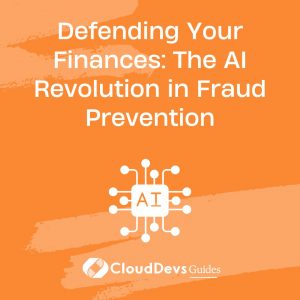Defending Your Finances: The AI Revolution in Fraud Prevention
In the fast-paced world of finance, the need for secure and reliable transactions is paramount. Whether you’re a startup founder seeking investment or a venture capitalist looking to protect your assets, the importance of safeguarding financial transactions cannot be overstated. This is where the powerful combination of artificial intelligence (AI) and fraud prevention steps in to revolutionize the industry.
1. The Growing Threat of Financial Fraud
Financial fraud is a persistent threat that affects businesses of all sizes, from early-stage startups to well-established corporations. As we dive into the world of AI and its impact on fraud prevention, it’s crucial to understand the scale of the problem. According to a report by the Association of Certified Fraud Examiners (ACFE), global organizations lose an estimated 5% of their annual revenues to fraud, resulting in trillions of dollars lost each year.
2. AI-Powered Fraud Detection
To combat this growing menace, AI has emerged as a game-changer. Machine learning algorithms, neural networks, and predictive analytics are some of the AI tools being leveraged to secure financial transactions.
Behavioral Analysis: One of the key strengths of AI is its ability to analyze user behavior. By studying transaction patterns, AI systems can detect anomalies that might indicate fraudulent activity. For example, if a user suddenly makes a large transaction from an unusual location or during an unusual time, the AI can flag it for further investigation.
Pattern Recognition: AI models can identify complex patterns that humans might overlook. By sifting through vast amounts of data, AI can pinpoint subtle trends and connections that might indicate fraudulent behavior. This is especially useful for identifying sophisticated fraud schemes.
Real-Time Monitoring: AI systems can monitor transactions in real-time, making split-second decisions to approve or deny a transaction based on predefined rules and machine learning models. This instantaneous response is crucial in preventing fraudulent transactions from going through.
3. Real-World Examples
Let’s delve into some real-world examples of how AI is being used to secure financial transactions:
- PayPal’s AI-Powered Risk Management: PayPal, a leading online payment platform, uses AI to assess the risk associated with each transaction. Their AI models analyze thousands of data points, including user behavior and transaction history, to spot suspicious activity. This has significantly reduced fraud rates and increased user trust.
Learn more: [PayPal’s AI-Powered Risk Management](https://www.paypal.com/us/webapps/mpp/paypal-safety-and-security)
- Square’s Machine Learning Fraud Prevention: Square, a mobile payment company, employs machine learning to detect and prevent fraudulent card-not-present (CNP) transactions. Their AI algorithms analyze transaction data and can identify potential fraud before it happens.
Learn more: [Square’s Machine Learning Fraud Prevention](https://squareup.com/us/en/financials/square-up-fraud-prevention)
- JPMorgan Chase’s Anti-Money Laundering AI: JPMorgan Chase, one of the largest financial institutions in the world, utilizes AI to combat money laundering. Their AI system scans enormous amounts of data to identify suspicious transactions and meet regulatory requirements.
Learn more: [JPMorgan Chase’s Anti-Money Laundering AI](https://www.jpmorgan.com/commercial-banking/insights/anti-money-laundering-ai)
4. The Future of AI in Fraud Prevention
As technology continues to evolve, so will the capabilities of AI in fraud prevention. AI-powered systems will become even more sophisticated, adapting to new and emerging threats. The collaboration between early-stage startups, VC investors, and tech leaders will play a pivotal role in driving innovation in this space.
Conclusion
AI development and fraud prevention go hand in hand, providing a formidable defense against financial fraud. The examples mentioned here are just a glimpse of the immense potential that AI holds in securing financial transactions. As the financial landscape evolves, embracing AI will be essential to outperforming the competition and ensuring the safety of your financial endeavors.
Table of Contents









